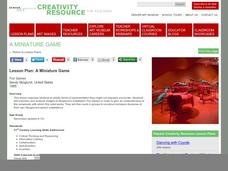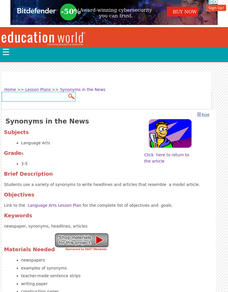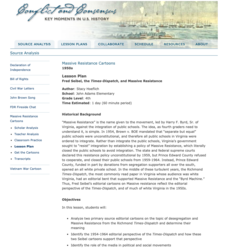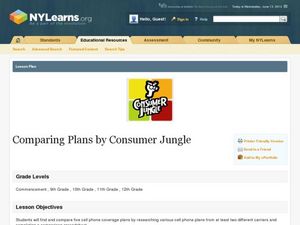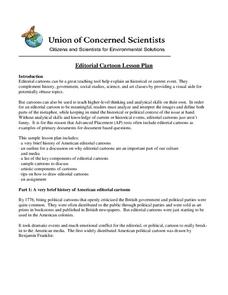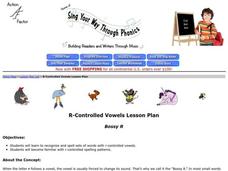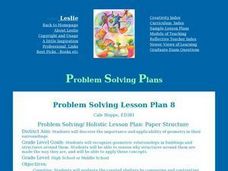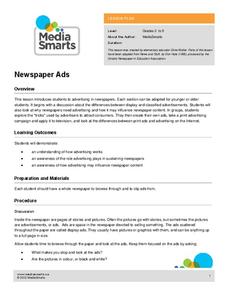National Endowment for the Humanities
Using Historic Digital Newspapers for National History Day
Your learners will take a trip through history as they peruse through historic digitalized newspapers, reading real articles from such historical periods in the United States as the Temperance movement...
Curated OER
Lesson Plan: A Miniature Game
Art inspires art, as children work to understand artistic forms that come from the imagination. They analyze the installation piece, Fox Games and then discuss the design process. They then use clay to create imaginative dioramas,...
Media Smarts
Looking at Newspapers: Introduction
A scavenger hunt introduces class groups to the different sections of newspapers and the different types of articles found in each section.
Curated OER
Newspaper Unit: Reading Lesson Plan
Work on identifying the different parts of a newspaper with your English learners. After reviewing newspaper terminology, pupils pair up and complete a scavenger hunt, looking for specific things in the newspaper and recording their...
NPR
Journalism Lesson Plan
Honor women in journalism with an online exhibit called Women with a Deadline. Class members demonstrate their understanding of the topic in a final assessment by writing a newspaper article on the information they learned in...
Curated OER
Language Arts Lesson Plan
Students use a variety of synonyms to write headlines and articles that resemble a model article.
Roy Rosenzweig Center for History and New Media
Fred Seibel, the Times-Dispatch, and Massive Resistance
A lesson challenges scholars to analyze editorial cartoons created by Fred Seibel, illustrator for the Times-Dispatch, during the Massive Resistance. A class discussion looking at today's editorial pages and Jim Crow Laws leads the...
National Endowment for the Humanities
Chronicling America: Uncovering a World at War
As part of a study of World War I, class members read newspaper articles from the time that urge American involvement, non-involvement, or neutrality. Using the provided worksheet, groups analyze the articles noting the central argument...
Social Media Toolbox
Social Media Usage
Is there a difference in the way organizations present news via social media and in print? The third in a series of 16 lessons from The Social Media Toolbox explores news outlets and their delivery methods. Groups follow a story for a...
Curated OER
Using Print Media in the LCTL Classroom
Explore newspapers as a form of print media. They examine headlines from newspapers and infer meanings of the headlines. They skim articles for information and exchange articles between groups. They complete charts while skimming the...
PBS
What Is Newsworthy?
What is news? What is newsworthy? Who decides and what criteria do they use? Introduce young journalists to the basics of reporting with this media literacy lesson.
Curated OER
Preparing a Business Plan to "Be Your Own Boss"
Do your scholars strive to work for themselves some day? Help young entrepreneurs create a business plan for an original idea and present it to a "board of directors." They complete online research (some links provided) and put...
BBC
Victorian Lesson Plan
How has England changed? Are the streets the same today as they were in the time of the Tudors? Fourth year students compare and contrast the Victorian & Tudor streets to the streets of today. They research biographical information...
Curated OER
Comparing Plans
Good consumer practices such as price comparison can make or break a budget. Youngsters research five different cell phone carriers and the plans they offer. They compile their data and determine which plan offers the best value. They...
Curated OER
Editorial Cartoon Lesson Plan
Students consider the role of editorial cartoons on American politics. In this editorial cartoons instructional activity, students discover the history of the cartoons in America, analyze some cartoons, and then draw their own cartoons...
Curated OER
Sing Your Way Through Phonics Lesson Plan
Young scholars recognize and spell sets of words with r-controlled vowels. They become familiar with r-controlled spelling patterns.
Meadows Center for Preventing Educational Risk, University of Texas at Austin
Lesson 9 - Contractions
Is it do'nt or don't? How about doesn't or does'nt? A instructional activity on contractions helps learners identify, form, and use contractions. Components within the plan include direct instruction on decoding and encoding...
Curated OER
You've Gotta Have a Gimmick!: A Lesson in Junk Food Advertising
Young scholars examine marketing techniques used in television and magazine snack food ads. They analyze and discuss Internet kids clubs, complete various handouts that examine ads for food, and create a commercial for a food product.
Curated OER
Making Regolith
You may not be able to take a field trip to the moon, but that doesn't mean your class can't study moon rocks. Using graham crackers as the moon's bedrock and powdered donuts as micrometeorites, young scientists simulate...
Curated OER
Problem Solving/ Holistic Lesson Plan: Paper Structure
Learners observe geometric relationships in buildings and structures. They reason why structures are constructed in a specific way by applying geometric concepts. They construct a shelter using their geometric knowledge.
PBS
Facts vs. Opinions vs. Informed Opinions and their Role in Journalism
Do reporters write about what they see, or what they think? Examine the differences between investigative writing and opinion writing with a instructional activity from PBS. Learners look over different examples of each kind of...
Media Smarts
Newspaper Ads
Just how free is the press? After examining the advertising and propaganda techniques used by advertisers, class members consider the influence advertisers may exert over newspaper content.
ESL Kid Stuff
Actions - Present Continuous
What are you doing? Why, studying the present continuous tense, of course. Language learners engage in activities and exercises that provide them with practice crafting and answering questions using the present continuous tense.
Stanford University
Carlisle Indian Industrial School
How do policies aimed to help actually hurt? Native American boarding schools—an attempt at assimilating children of indigenous tribes into white culture—had a shattering effect on those who attended. With primary sources, including...



